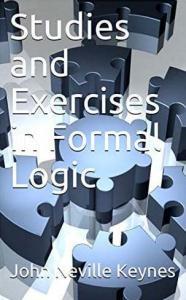
Studies and exercises in Formal Logic was written in 1884 by the university lecturer in Moral Science at Cambridge, John Neville Keynes. If his name is familiar it might because he was the father of the economist John Maynard Keynes who wrote The General Theory of Employment, Interest, and Money. The book is extremely demanding if you are not schooled in philosophy and especially logic, this goes deep. From the introduction:
Logic may be defined as the science which investigates the general principles of valid thought. Its object is to discuss the characteristics of judgments, regarded not as psychological phenomena but as expressing our knowledge and beliefs; and, in particular, it seeks to determine the conditions under which we are justified in passing from given judgments to other judgments that follow from them.
The book is written as both an introduction to the field of logic and textbook with exercises for the student at the end of each chapter. Read and understand chapter 3 and you will be fit to answer questions like these:
If all x is y, and some x is z, and p is the name of those z’s which are x ; is it a verbal proposition to
say that all p is y?
Enquire whether the following propositions are real or verbal: (a) Homer wrote the Iliad, (b)
Milton wrote Paradise Lost.
Download Studies and exercises in Formal Logic here as a free PDF e-book (614 pages/4.9MB):
 Studies and Exercises in Formal Logic
Studies and Exercises in Formal Logic

